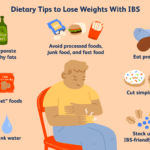
Last Updated on by Sabina
Losing weight can be a challenging journey, but with the right strategies and mindset, you can achieve your weight loss goals. In this article, we will provide you with practical tips to Help you Lose Weight and make sustainable lifestyle changes.

Set Realistic Goals
Start by setting realistic and achievable goals. Instead of aiming for drastic weight loss, focus on gradual and steady progress. This approach is more sustainable and allows your body to adjust to the changes. Set specific and measurable goals that you can track and celebrate your progress along the way.
Create a Calorie Deficit
To lose weight, you need to create a calorie deficit by consuming fewer calories than you burn. Start by understanding your daily calorie needs and track your intake using a food diary or mobile app. Make healthier food choices by opting for nutrient-dense, whole foods such as fruits, vegetables, lean proteins, and whole grains. Reduce your intake of processed foods, sugary beverages, and high-fat snacks, which are often calorie-dense and low in nutritional value.
Portion Control
Practice portion control to manage your calorie intake. Be mindful of portion sizes and use smaller plates and bowls to trick your brain into feeling satisfied with smaller portions. Chew your food slowly and savor each bite, allowing your body to register fullness. Avoid eating in front of screens or while distracted, as it can lead to overeating.
Regular Physical Activity
Incorporate regular physical activity into your routine. Engage in activities you enjoy, such as brisk walking, cycling, swimming, or dancing. Aim for at least 150 minutes of moderate-intensity aerobic exercise or 75 minutes of vigorous exercise each week. Additionally, include strength training exercises to build muscle, which can increase your metabolism and help with weight loss.
Stay Hydrated
Drinking an adequate amount of water is essential for weight loss. Often, we mistake thirst for hunger, leading to unnecessary snacking. Stay hydrated throughout the day by drinking water regularly. Start your day with a glass of water and carry a reusable water bottle with you to ensure you stay hydrated.
Get Adequate Sleep
Prioritize quality sleep as it plays a crucial role in weight management. Lack of sleep can disrupt hormone regulation, leading to increased hunger and cravings. Aim for 7-9 hours of sleep per night. Establish a relaxing bedtime routine, create a comfortable sleep environment, and avoid caffeine and electronic devices before bed.
Manage Stress
Stress can contribute to weight gain and hinder weight loss efforts. Find healthy ways to manage stress, such as practicing mindfulness, deep breathing exercises, yoga, or engaging in hobbies and activities you enjoy. Get support from friends, family, or a therapist if needed.
Seek Support and Accountability
Enlist the support of a friend, family member, or join a weight loss community to stay motivated and accountable. Share your goals and progress with others, celebrate milestones together, and seek guidance or encouragement when needed.
Losing weight is a journey that requires commitment, patience, and consistency. By implementing these tips and making small, sustainable changes to your lifestyle, you can achieve your weight loss goals and improve your overall well-being. Remember, it’s important to listen to your body, be kind to yourself, and celebrate every step forward on your weight loss journey.


